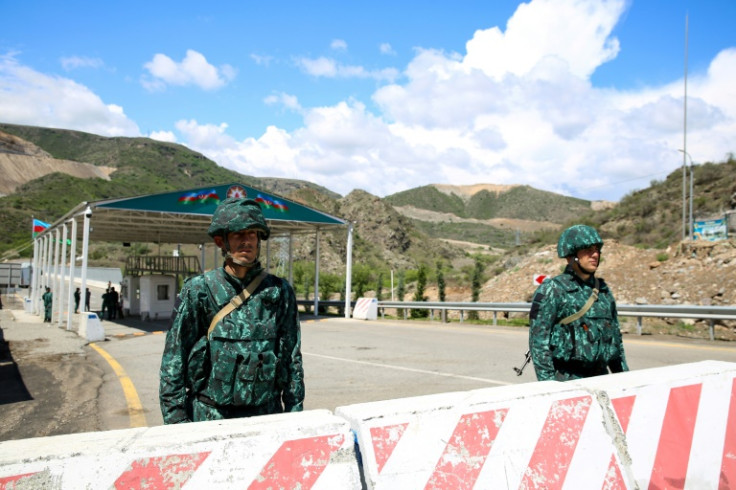Karabakh Separatists Urge Russia To Open Corridor To Armenia

A separatist official in Armenian-populated Nagorno-Karabakh in Azerbaijan on Thursday called on Russia to ensure free movement on the only road linking the breakaway region to Armenia, warning of dire humanitarian consequences.
Armenia's Prime Minister Nikol Pashinyan earlier announced fresh EU-mediated peace talks, as Western engagement grows in region where Russia -- distracted by its war in Ukraine -- appears to be losing influence.
Karabakh has been at the centre of a decades-long territorial dispute between Azerbaijan and Armenia, which have fought two wars over the mountainous territory, mainly populated by Armenians.
On Tuesday, Azerbaijan said it was shutting the only road linking the region to Armenia, accusing the Armenian branch of the Red Cross of smuggling.
State Minister Gurgen Nersisyan called on Russia -- which helped broker the latest ceasefire between the two countries -- to step in.
"We ask to ensure unimpeded movement, transportation of people and cargo along the corridor connecting Artsakh with Armenia," Nersisyan said, using the Armenian name for the region.
Russia sponsored the latest ceasefire that ended six weeks of fighting in autumn 2020 and saw Armenia cede swathes of territories it had controlled for decades.
Under the deal, the five-kilometre-wide Lachin Corridor was to be manned by Russian peacekeepers to ensure free passage between Armenia and Karabakh.
Since Azerbaijan shut the corridor there have been concerns over a humanitarian crisis in the restive enclave, which is experiencing food shortages and where locals lack access to health services, according to separatist authorities.
"The situation is terrible, in a few days we will have irreversible consequences," Nersisyan said.
AFP this week spoke to locals in the rebel region's main city, Stepanakert, who reported food shortages and critical problems with access to medical services.
Nersisyan called on residents to gather at in the Stepanakert Renaissance Square Friday at 9:00 am (0500 GMT) to "begin a peaceful struggle for our existence".
Armenia, which has relied on Russia for military and economic support since the collapse of the Soviet Union in 1991, has accused Moscow of failing to fulfil its peacekeeping role in Karabakh.
With Russia bogged down in Ukraine and unwilling to strain ties with Azerbaijan's key ally Turkey, the United States and European Union have sought to repair ties between the Caucasus rivals.
Speaking at a cabinet meeting, Pashinyan announced a next round of peace talks with Azerbaijani President Ilham Aliyev on Saturday in Brussels under the mediation of European Council President Charles Michel.
"I confirmed my participation in the meeting, and I hope we will achieve progress in our talks on a peace treaty," Pashinyan said.
An EU official said the trilateral meeting -- the sixth in nearly two years -- would cover humanitarian issues, border delimitation, the peace treaty and rights and security of Karabakh Armenians, and connectivity.
"We consider the leaders-level engagement essential to promote peaceful settlement and to prevent escalation," the official said in Brussels, speaking on condition of anonymity.
Pashinyan also said the "illegal blockade" contradicts a ruling of the International Court of Justice (ICJ).
The UN's top judicial body ordered Azerbaijan in February to ensure free movement along the Lachin Corridor, Karabakh's sole land link with Armenia.
"As far as the illegal blockade of the Lachin Corridor and the deepening humanitarian crisis are concerned, the binding ruling of the ICJ creates a possibility for a greater international consolidation to prevent Azerbaijan's policy of ethnic cleansing in Karabakh," Pashinyan said.
© Copyright AFP 2025. All rights reserved.





















